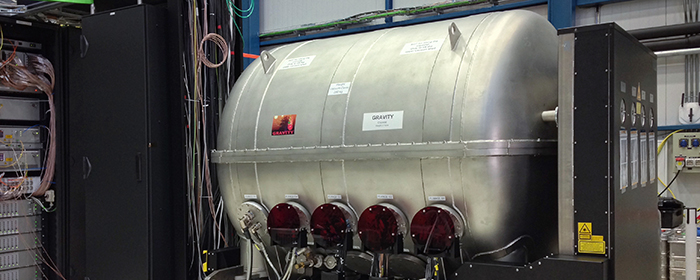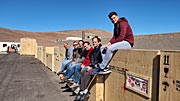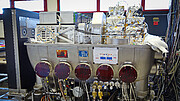Anuncio
Nuevo y potente instrumento para el estudio de agujeros negros llega a Paranal
Ensamblaje y puesta a prueba del instrumento GRAVITY del VLTI
11 de Agosto de 2015
Un nuevo instrumento denominado GRAVITY ha sido enviado a Chile y con éxito ensamblado y probado en el Observatorio Paranal.
GRAVITY es un instrumento de segunda generación a emplearse en el Interferómetro del Very Large Telescope (VLTI). Este permitirá calcular las posiciones y movimientos de objetos astronómicos en escalas mucho más pequeñas además de realizar espectroscopía e imágenes interferométricas. GRAVITY dará la más avanzada visión al VLT, combinado cuatro telescopios individuales del Observatorio Paranal para que actúen como uno de 100 metros de diámetro.
Gracias al uso de nuevas técnicas, GRAVITY ofrecerá sensibilidad y precisión inigualables en relación a los parámetros actuales (1). Podrá medir la posición relativa de objetos astronómicos con una precisión de 10 microsegundos de arco y realizar imágenes con una resolución de cuatro milésimas de segundos de arco. A modo de ilustración, esto corresponde a ver edificios en la Luna e identificarlos con pocos centímetros.
GRAVITY empujara los límites de la astronomía de elevada resolución angular: permitirá establecer la Física cerca del agujero negro en el centro de la galaxia, región dominada por los efectos predichos por la teoría general de la relatividad de Einstein. Además, revelará los detalles de la masa de discos y chorros de acreción, procesos que ocurren en objetos estelares jóvenes y en los núcleos activos de galaxias. También destacará en rastrear los movimientos de estrellas binarias, exoplanetas y discos estelares jóvenes, y proporcionará imágenes de las superficies de las estrellas.
El 21 de julio de 2015, un equipo obtuvo "las primeras bandas de laboratorio" provenientes de GRAVITY en el salón de integración de Paranal (Paranal Integration Hall) utilizando una fuente de luz de prueba. A esto se le sumará nuevas pruebas y la preparación para el Interferómetro del VLT, para luego ser instalado en el VLTI para ver las "primeras bandas de estrellas" usando los cuatro telescopios auxiliares de 1,8 metros en noviembre de 2015. Las pruebas de GRAVITY con las Unidades de Telescopio del VLT de 8 metros, están previstas para el primer semestre de 2016.
El desarrollo de GRAVITY estuvo a cargo del Instituto Max Planck de Física Extraterrestre, en Garching, Alemania, además de contar con la participación de seis institutos a lo largo de toda Europa (2), y la colaboración de ESO.
Notas
(1) Gravity cuenta combinadores de haces de fibra óptica integrada, sensores de onda infrarrojas para óptica adaptativa entre otros.
(2) Los institutos socios del consorcio GRAVITY son:
- Instituto Max Planck de Física Extraterrestre, Garching, Alemania
- LESIA, Observatorio de Paris, Universidad Paris Diderot, Meudon, Francia
- Instituto Max Planck de Astronomía, Heidelberg, Alemania
- Universidad de Colonia, Colonia, Alemania
- Instituto de Planetología y Astrofísica de Grenoble (IPAG), Grenoble, Francia
- Laboratório de Sistemas, Instrumentação e Modelação em Ciências e Tecnologias do Ambiente e do Espaço (SIM), Lisboa y Porto, Portugal
- ESO, Garching, Germany
Enlaces
Contactos
Markus Schoeller
ESO, Garching, Alemania
Correo electrónico: mschoell@eso.org
Frank Eisenhauer
Instituto Max Planck de Física Extraterrestre, Garching, Alemania
Email: eisenhau@mpe.mpg.de
Richard Hook
Encargado de Prensa de ESO
Garching bei München, Alemania
Tel: +49 89 3200 6655
Cel: +49 151 1537 3591
Correo electrónico: rhook@eso.org
Sobre el anuncio
| Identificador: | ann15061 |
Our use of Cookies
We use cookies that are essential for accessing our websites and using our services. We also use cookies to analyse, measure and improve our websites’ performance, to enable content sharing via social media and to display media content hosted on third-party platforms.
ESO Cookies Policy
The European Organisation for Astronomical Research in the Southern Hemisphere (ESO) is the pre-eminent intergovernmental science and technology organisation in astronomy. It carries out an ambitious programme focused on the design, construction and operation of powerful ground-based observing facilities for astronomy.
This Cookies Policy is intended to provide clarity by outlining the cookies used on the ESO public websites, their functions, the options you have for controlling them, and the ways you can contact us for additional details.
What are cookies?
Cookies are small pieces of data stored on your device by websites you visit. They serve various purposes, such as remembering login credentials and preferences and enhance your browsing experience.
Categories of cookies we use
Essential cookies (always active): These cookies are strictly necessary for the proper functioning of our website. Without these cookies, the website cannot operate correctly, and certain services, such as logging in or accessing secure areas, may not be available; because they are essential for the website’s operation, they cannot be disabled.
Functional Cookies: These cookies enhance your browsing experience by enabling additional features and personalization, such as remembering your preferences and settings. While not strictly necessary for the website to function, they improve usability and convenience; these cookies are only placed if you provide your consent.
Analytics cookies: These cookies collect information about how visitors interact with our website, such as which pages are visited most often and how users navigate the site. This data helps us improve website performance, optimize content, and enhance the user experience; these cookies are only placed if you provide your consent. We use the following analytics cookies.
Matomo Cookies:
This website uses Matomo (formerly Piwik), an open source software which enables the statistical analysis of website visits. Matomo uses cookies (text files) which are saved on your computer and which allow us to analyze how you use our website. The website user information generated by the cookies will only be saved on the servers of our IT Department. We use this information to analyze www.eso.org visits and to prepare reports on website activities. These data will not be disclosed to third parties.
On behalf of ESO, Matomo will use this information for the purpose of evaluating your use of the website, compiling reports on website activity and providing other services relating to website activity and internet usage.
Matomo cookies settings:
Additional Third-party cookies on ESO websites: some of our pages display content from external providers, e.g. YouTube.
Such third-party services are outside of ESO control and may, at any time, change their terms of service, use of cookies, etc.
YouTube: Some videos on the ESO website are embedded from ESO’s official YouTube channel. We have enabled YouTube’s privacy-enhanced mode, meaning that no cookies are set unless the user actively clicks on the video to play it. Additionally, in this mode, YouTube does not store any personally identifiable cookie data for embedded video playbacks. For more details, please refer to YouTube’s embedding videos information page.
Cookies can also be classified based on the following elements.
Regarding the domain, there are:
- First-party cookies, set by the website you are currently visiting. They are stored by the same domain that you are browsing and are used to enhance your experience on that site;
- Third-party cookies, set by a domain other than the one you are currently visiting.
As for their duration, cookies can be:
- Browser-session cookies, which are deleted when the user closes the browser;
- Stored cookies, which stay on the user's device for a predetermined period of time.
How to manage cookies
Cookie settings: You can modify your cookie choices for the ESO webpages at any time by clicking on the link Cookie settings at the bottom of any page.
In your browser: If you wish to delete cookies or instruct your browser to delete or block cookies by default, please visit the help pages of your browser:
Please be aware that if you delete or decline cookies, certain functionalities of our website may be not be available and your browsing experience may be affected.
You can set most browsers to prevent any cookies being placed on your device, but you may then have to manually adjust some preferences every time you visit a site/page. And some services and functionalities may not work properly at all (e.g. profile logging-in, shop check out).
Updates to the ESO Cookies Policy
The ESO Cookies Policy may be subject to future updates, which will be made available on this page.
Additional information
For any queries related to cookies, please contact: pdprATesoDOTorg.
As ESO public webpages are managed by our Department of Communication, your questions will be dealt with the support of the said Department.




